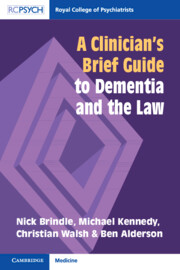Book contents
- A Clinician’s Brief Guide to Dementia and the Law
- A Clinician’s Brief Guide to Dementia and the Law
- Copyright page
- Contents
- Preface
- Common Abbreviations
- Chapter 1 Dementia
- Chapter 2 Dementia
- Chapter 3 Dementia
- Chapter 4 The Mental Capacity Act 2005
- Chapter 5 The Mental Health Act 1983
- Chapter 6 The Care Act 2014
- Chapter 7 Assessment of Capacity
- Chapter 8 The Diagnosis of Dementia
- Chapter 9 Care and Treatment Issues and the Law
- Chapter 10 Deprivation of Liberty
- Chapter 11 Discharge from Hospital
- Chapter 12 Abuse and Safeguarding
- Chapter 13 The Courts and Tribunals
- Chapter 14 The Interface between Dementia and the Criminal Justice System
- Book part
- References
- Index
Chapter 7 - Assessment of Capacity
Published online by Cambridge University Press: 20 July 2023
- A Clinician’s Brief Guide to Dementia and the Law
- A Clinician’s Brief Guide to Dementia and the Law
- Copyright page
- Contents
- Preface
- Common Abbreviations
- Chapter 1 Dementia
- Chapter 2 Dementia
- Chapter 3 Dementia
- Chapter 4 The Mental Capacity Act 2005
- Chapter 5 The Mental Health Act 1983
- Chapter 6 The Care Act 2014
- Chapter 7 Assessment of Capacity
- Chapter 8 The Diagnosis of Dementia
- Chapter 9 Care and Treatment Issues and the Law
- Chapter 10 Deprivation of Liberty
- Chapter 11 Discharge from Hospital
- Chapter 12 Abuse and Safeguarding
- Chapter 13 The Courts and Tribunals
- Chapter 14 The Interface between Dementia and the Criminal Justice System
- Book part
- References
- Index
Summary
The ability to make decisions (and thereby its assessment) can be complex. It may be affected by a combination of factors that vary between individuals. Even when cognitive functioning may be compromised (for instance, by dementia), a person may still be able to express important deep-rooted values underpinning their decisions. The circumstances may demand that these different elements are explored in greater or lesser detail in making conclusions about an individual’s decision-making capacity. This may add to the complexity of an assessment. From the outset, to make an adequately informed treatment or other decision, you must have sufficient information, be able to make the decision free from coercion and have mental capacity.
Notwithstanding the challenges, with appropriate thought, preparation and attention to documentation, it should be possible to record a legally defensible assessment of capacity for most situations that arise in clinical practice. The purpose of this chapter is to provide an accessible approach to capacity assessment and its recording.
- Type
- Chapter
- Information
- A Clinician's Brief Guide to Dementia and the Law , pp. 52 - 65Publisher: Cambridge University PressPrint publication year: 2023



